Here are my favorite poems about scarecrows categorized:
- Poems about scarecrows for children
- Rhyming poems about scarecrows
So if you want the best poems about scarecrows, then you’re in the right place.
Let’s get started!
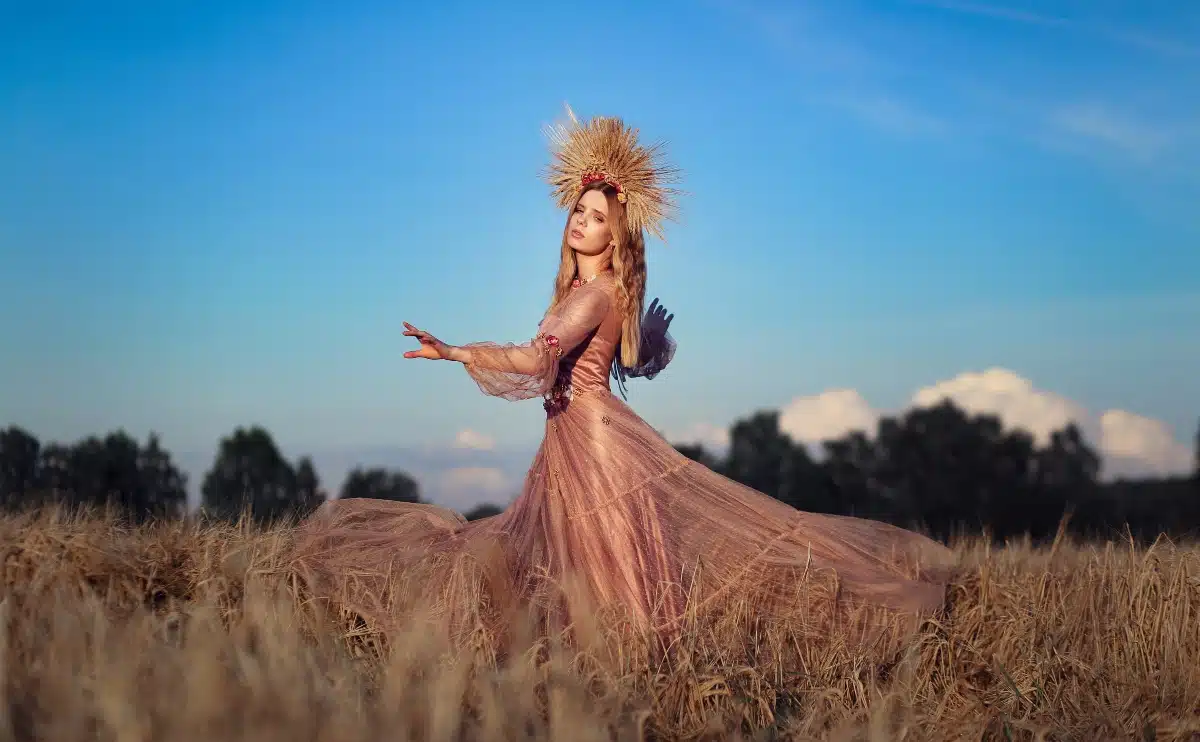
Thrilling Poems About Scarecrows
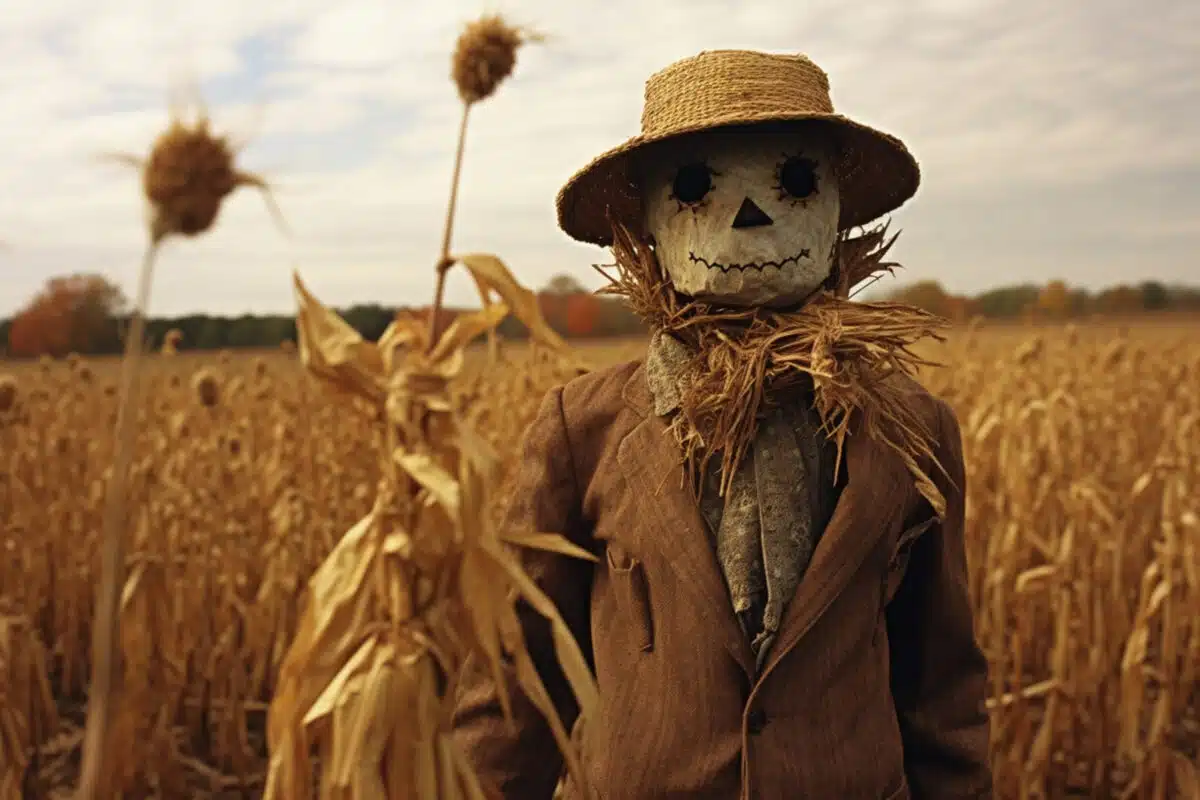
Scarecrows, those silent guardians of the fields, have long fascinated and intrigued the human imagination.
They stand tall, their ragged clothes fluttering in the wind, seemingly imbued with a mysterious presence.
In the literary world of poetry, scarecrows have become a captivating symbol, evoking a range of emotions from fear to empathy.
In this collection, we delve into the realm of scarecrow poetry, where each poem takes us on a thrilling journey, exploring themes of isolation, resilience, and the eerie beauty that lies within the fields.
So, join us as we unravel the secrets of these straw-filled sentinels and discover the power of scarecrow poems.
Let’s get right to it!
My #1 Favorite Poem About Scarecrows
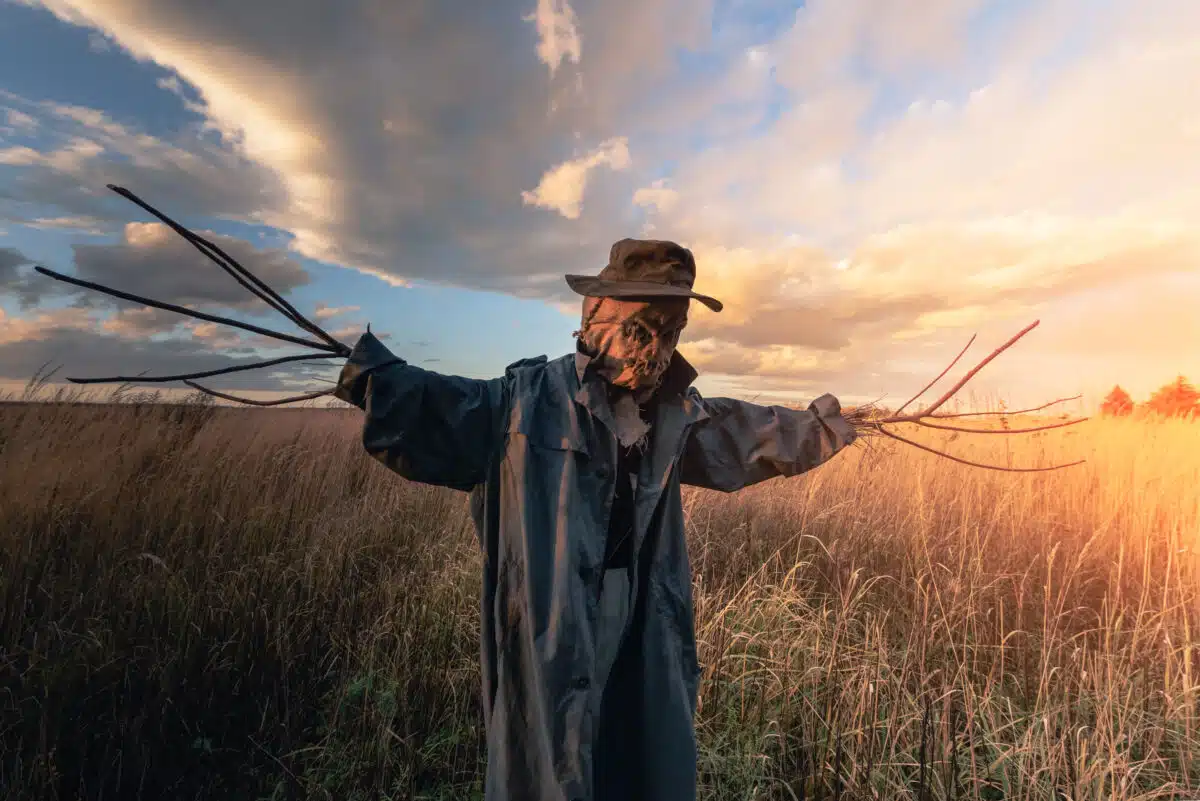
“The Scarecrow” by Walter De La Mare
All winter through I bow my head
Beneath the driving rain;
The North wind powders me with snow
And blows me black again;
At midnight ‘neath a maze of stars
I flame with glittering rime,
And stand, above the stubble, stiff
As mail at morning-prime.
But when that child, called Spring, and all
His host of children, come,
Scattering their buds and dew upon
Those acres of my home,
Some rapture in my rags awakes;
I lift void eyes and scan
The skies for crows, those ravening foes,
Of my strange master, Man.
I watch him striding lank behind
His clashing team, and know
Soon will the wheat swish body high
Where once lay sterile snow;
Soon shall I gaze across a sea
Of sun-begotten grain,
Which my unflinching watch hath sealed
For harvest once again.
Why Is “The Scarecrow” My Favorite Poem About Scarecrows
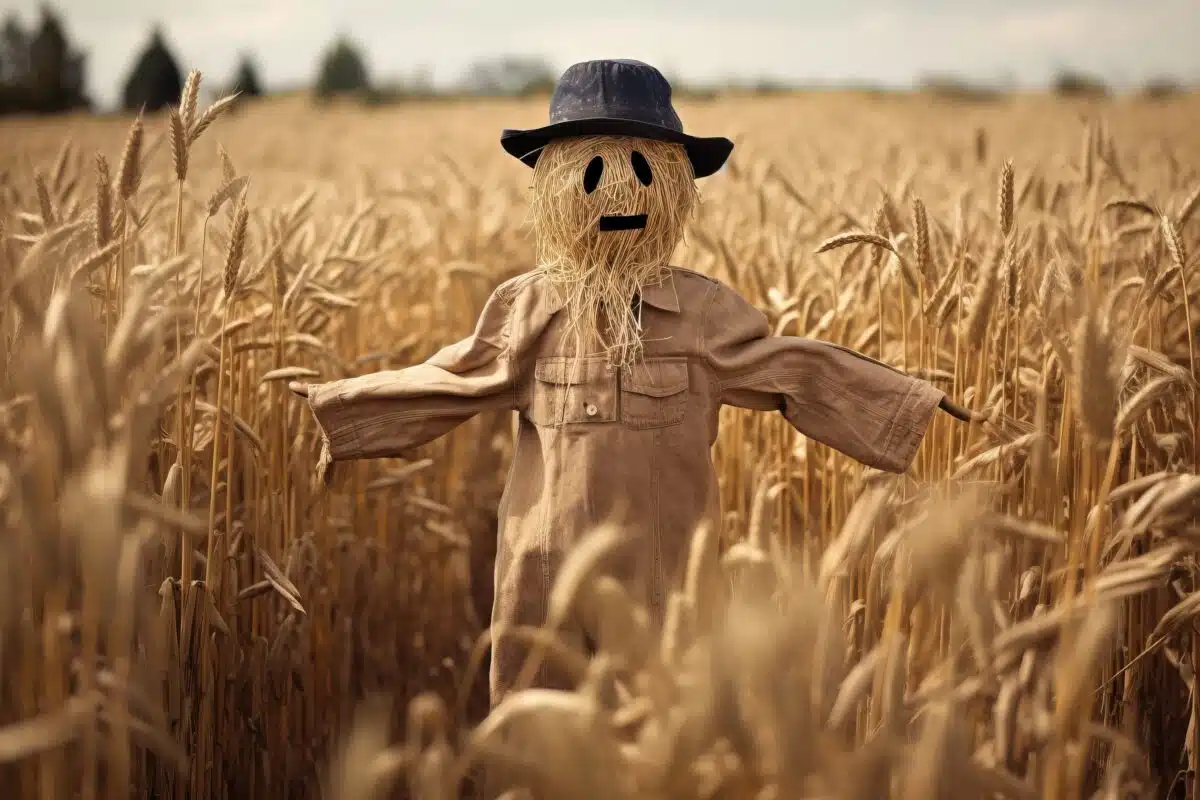
“The Scarecrow” by Walter De La Mare captivates me with its imagery, painting a hauntingly beautiful picture of the lonely figure standing amidst the fields.
What I find particularly intriguing is the rich symbolism used by the author.
It not only describes the purpose of a scarecrow but also leaves room for personal interpretation, allowing each reader to find their own meaning within its verses.
This poem resonates with me on a deeper level, as it explores themes of isolation, the longing for connection, and the sometimes lonely journey towards finding our purpose in life.
De La Mare also showcases his storytelling power in “The Scarecrow”, which is an epic narrative that transports me to another time and place.
Poems About Scarecrows for Children
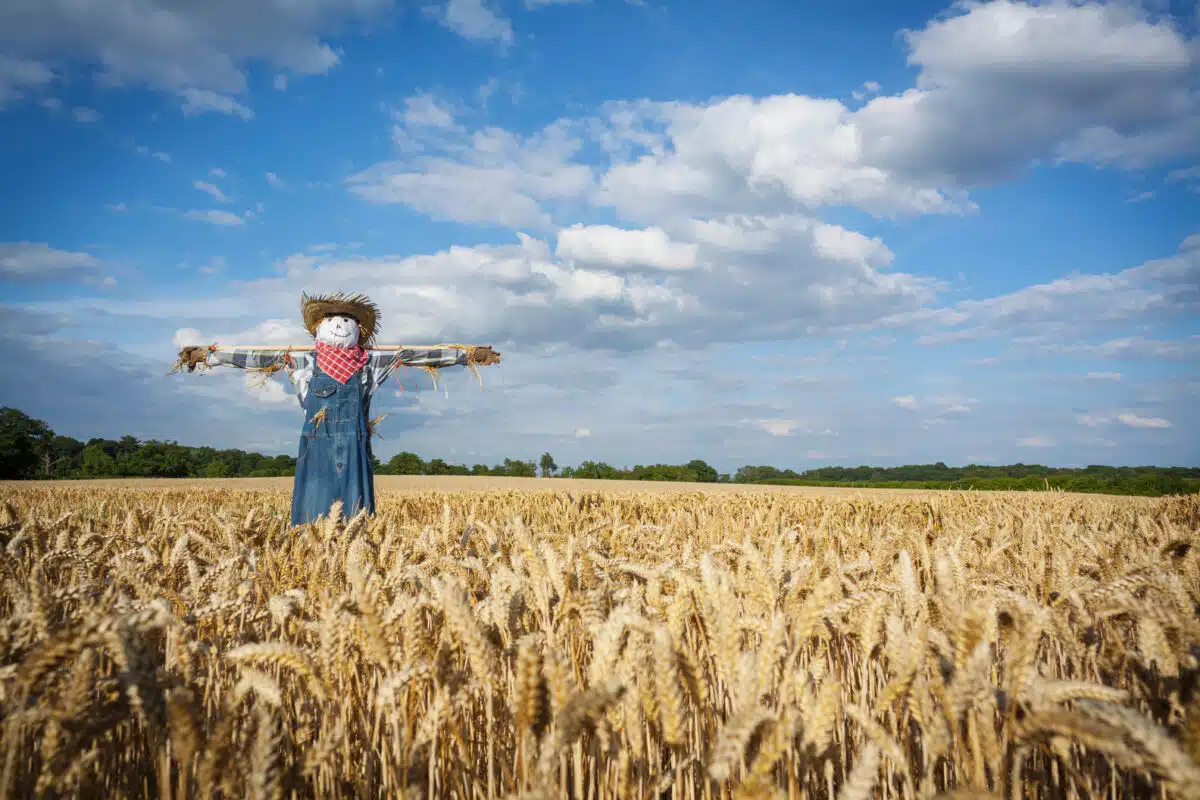
Welcome to the enchanting world of scarecrow poems for children!
Get ready to embark on a delightful journey filled with whimsical tales, where these charming guardians of the fields come to life through words, capturing the imagination of young readers and sprinkling a touch of magic in their hearts.
“The Scarecrow” by Madison Julius Cawein
Here is a tale for prelates and for parsons:
There was a scarecrow once, a thing of tatters
And sticks and straw, to whom men trusted matters
Of weighty moment murders, thefts and arsons.
None saw he was a scarecrow. Every worship
And honour his. Men set him in high places,
And ladies primped their bodies, tinged their faces,
And kneeled to him as slaves to some great Sirship.
One night a storm, none knew it, blew to pieces
Our jackstraw friend, and the sweet air of heaven
Knew him no more, and was no longer tainted.
Then learned doctors put him in their theses:
The State set up his statue: and thought, even
As thought the Church, perhaps he should be sainted.
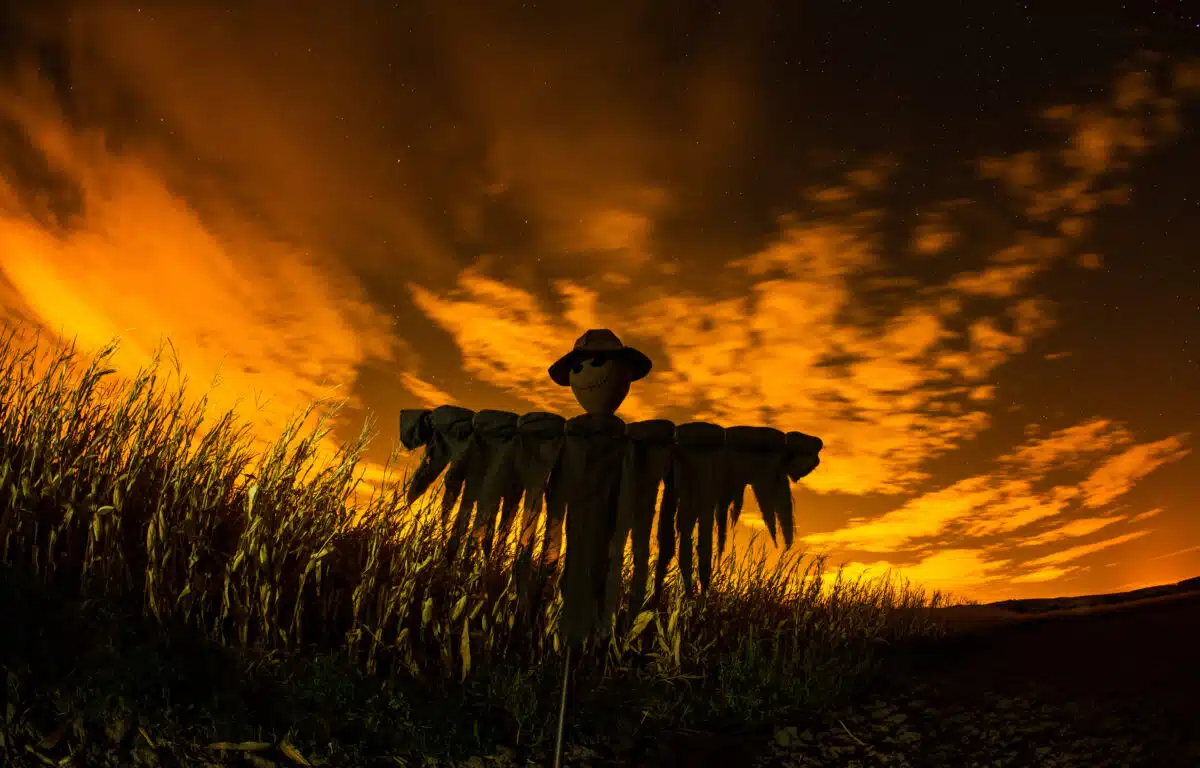
“The Scarecrow” by Walter Crane
O all you little blackey tops,
Pray don’t you eat my father’s crops,
While I lie down to take a nap.
Shua O! Shua O!
If father he perchance should come,
With his cocked hat and his long gun,
Then you must fly and I must run.
Shua O! Shua O!
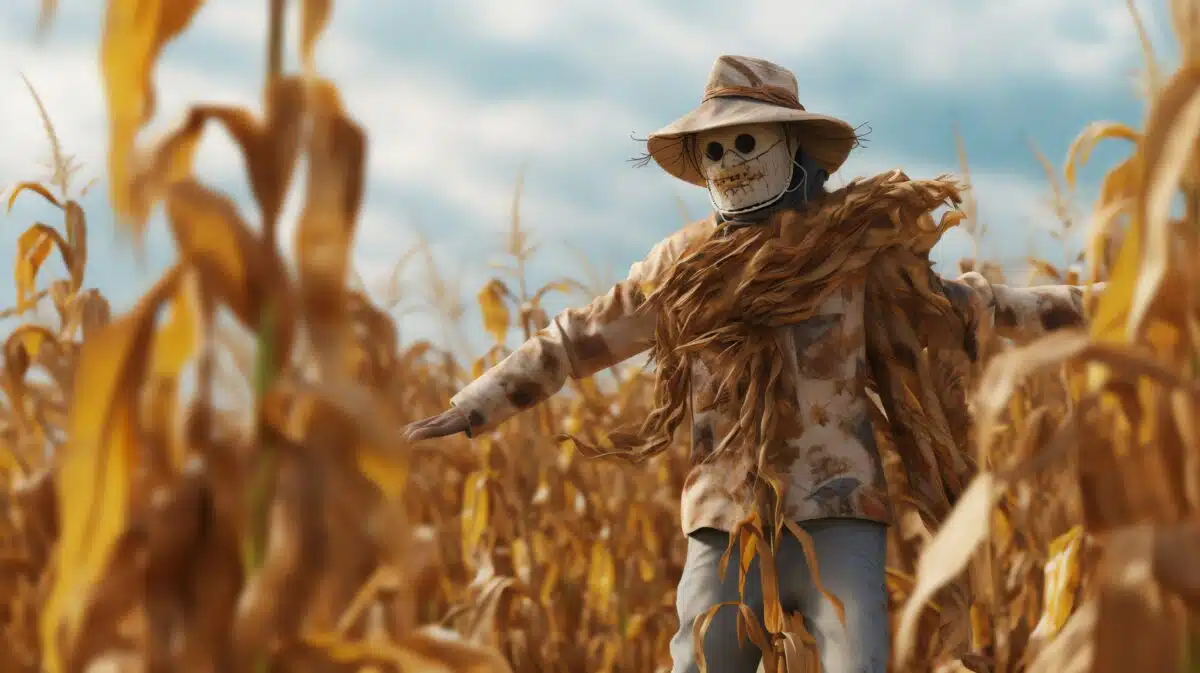
“Farmer Nick’s Scarecrow” by Nora E. Crosby
Out in the cornfield , grouped together,
A flock of crows discussed the weather.
Observing them , thrifty Farmer Nick
Declared that the crows were “ gettin’ too thick. ”
“I must have a scarecrow—that is true;
Now, would not that old umbrella do?”
So into the house the farmer went,
And away to the field the umbrella sent.
One rainy day the farmer went out
To view the cornfields lying about;
He neared the umbrella; looked inside;
And what he saw made him laugh till he cried!
For in there, out of the rainy weather,
A dozen crows were huddled together!
So the farmer, laughing as farmers should,
Said, “I fear my scarecrow did little good.”
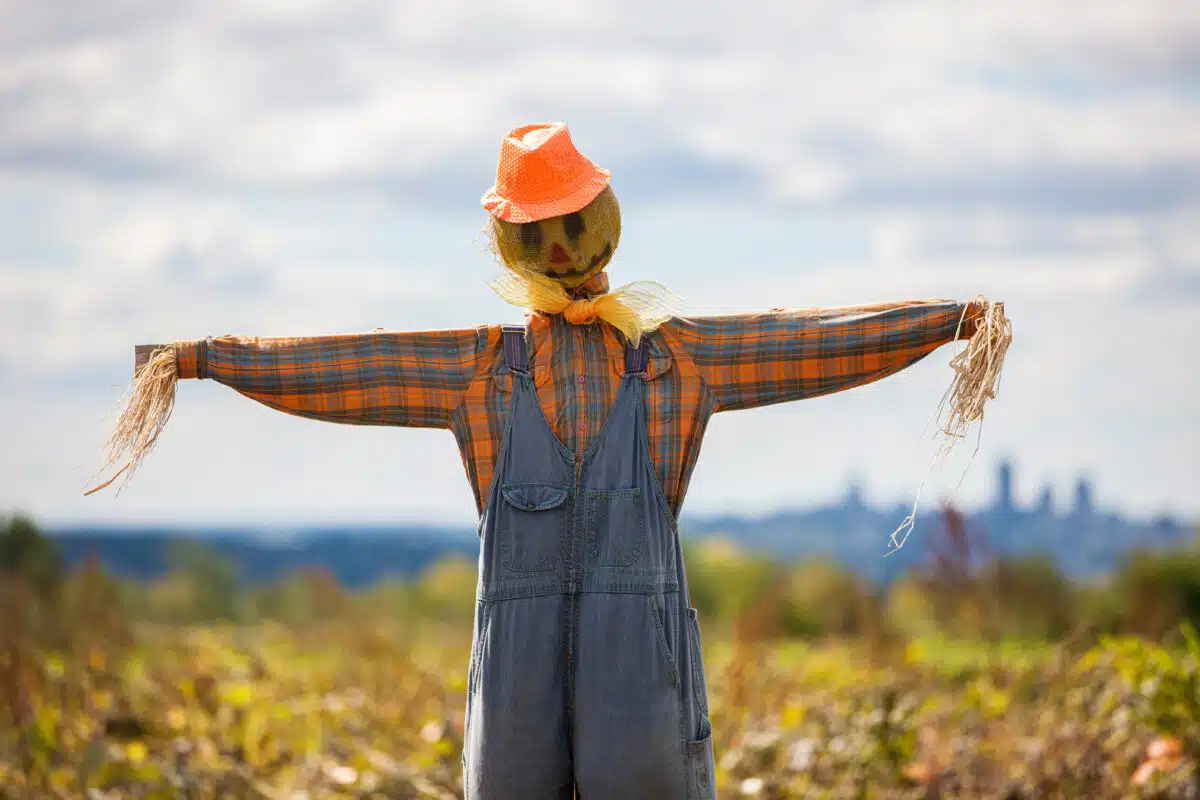
From “The Protest” by Guy de Maupassant
Inflate this wooden gendarme-this burlesque
Of manhood, placed like bogles in a tree
This scarecrow, standing, clumsy and grotesque,
To frighten lovers from your company.
But never scarecrow yet was terrifying
(Albeit he were clownish and uncouth)
To birds, who see no reason to be flying
When once they come to know the simple truth.
And if he stands between us in our road,
We’ll press each other tight, and he’ll explode!
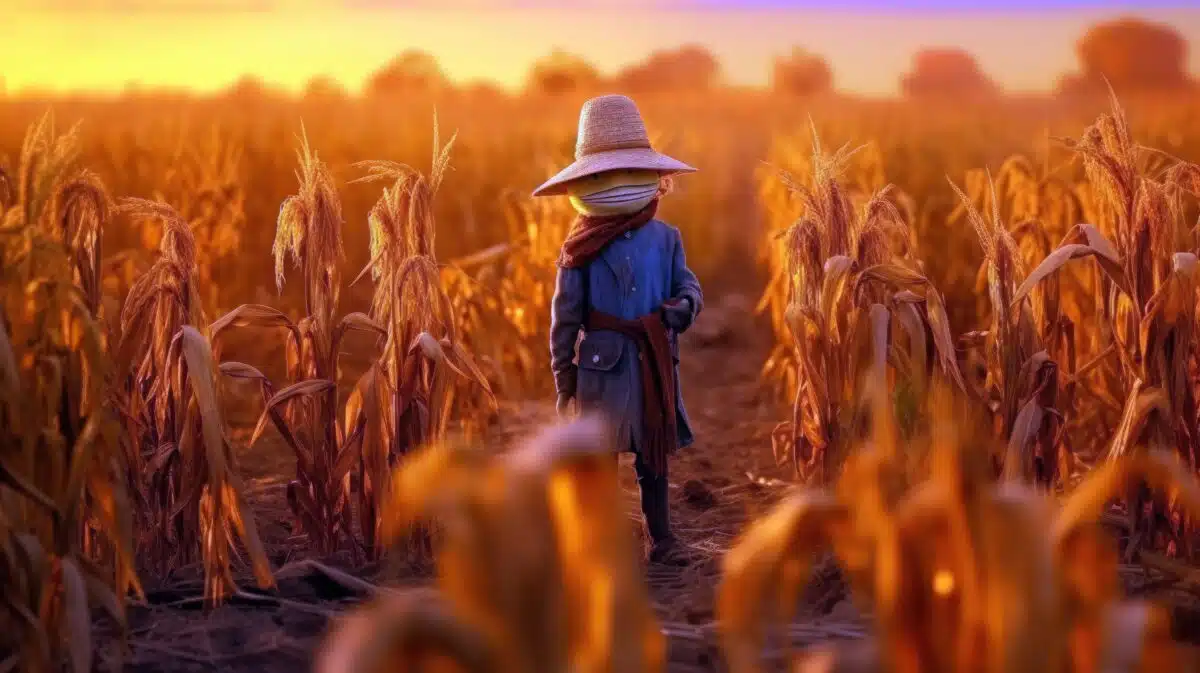
“The Besom-Maker and Scarecrow” by David Lewis (of York)
A man was respected all over the town,
For making fine Besoms—his name was Tom Brown;
His Besoms swept clean, and so heat to the eye,
That the maids simper’d at him whene’er he pass’d by.
At Woodland’s and Heath-moors was pretty well known,
Where ought that would suit him he took as his own;
One day in his rounds, when his old coat he wore,
His defence from the cold for five winters or more.
In a field ofcut wheat by the side of a wood,
To frighten the birds off, a Scarecrow there stood,
Trimm’d up in old clothes—a stick for a gun,
The farmer concealed, laugh’d much at the fun:
For Tom seeking Broom sticks rang’d over the ground,
Came unto the Scarecrow and view’d it around:
“What a pity,” he cried, “that good coat should rot
there,
“While mine with hard wearing, is patch’d, ragg’d, and bare;
” The world is oft dealt só, nor does it seem strange,
” What say’st thou friend Scarecrow, shall thee and
change?”
The Scarecrow said nothing—Tom construed consent,
So unto undressing immediately went;
Dress’d himself and the Scarecrow in each other’s coat,
Tho’ both put together were scarce worth a groat:
Tom pleas’d with the change, bade the Scarecrow good
night,
Bent homeward his way, but when scarce out of sight,
He begun to reflect, and to say ‘ twas unkind,
To leave his companion, the old coat, behind;
To such base ingratitude he should be loath,
So he then turned back, and secured them both.
Rhyming Poems About Scarecrows
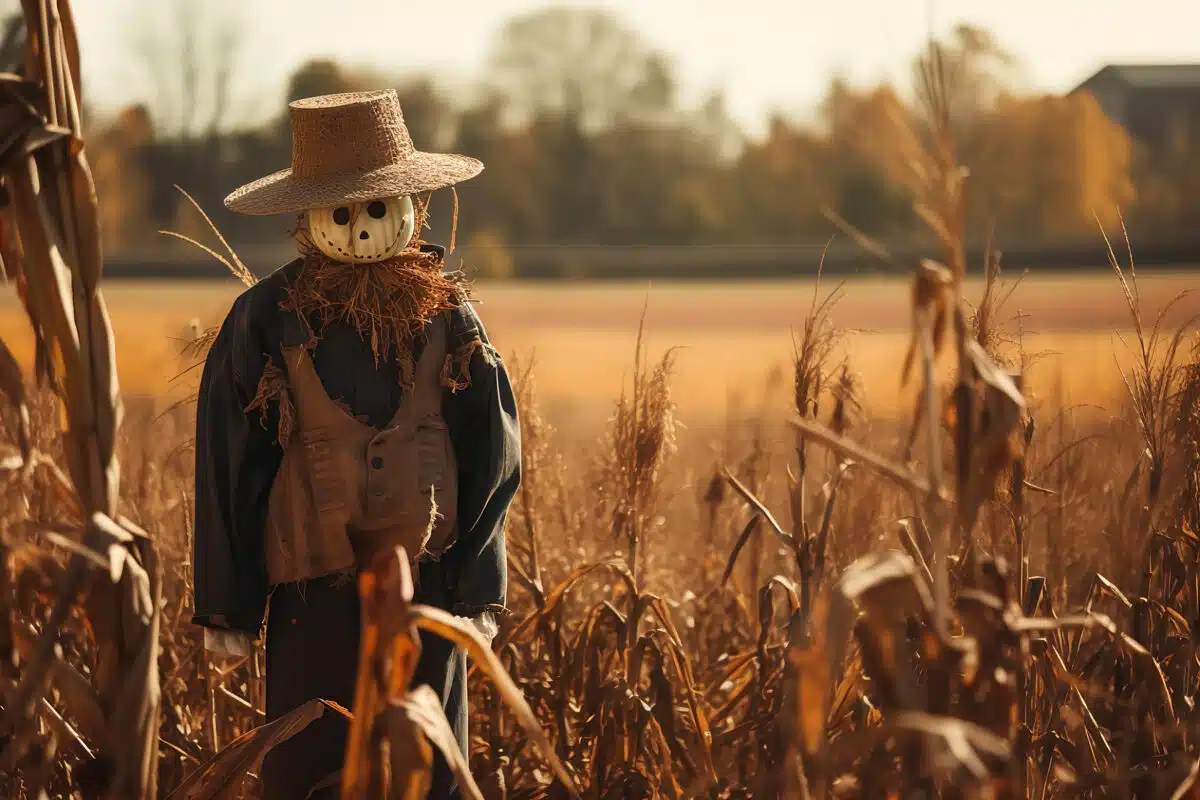
Step into the enchanting world of scarecrow rhyming poems!
Delve into delightful verses that weave tales of these whimsical figures of the fields, adorned with straw and charm, as they dance to the rhythm of nature and protect our crops with a touch of magic.
“The Scarecrow” by Anonymous
I.
Not Chloe’s Shape nor thousand Charms,
Have Pow’r to win me to her Arms.
I unconcern’d behold those Eyes,
Nor figh, nor feel the leaft Surprize.
II.
Her Wit attracts my Soul no more,
Than all her Beauty did before!
She sings— whilst Hundreds listen round,
Unmov’d I hear th’ enchanting Sound!
III.
So young, fo witty, and fo fair,
As Chloe, certainly you are:
How comes it that my Heart denies
It’s Tribute, and your Sway defies?
IV.
So fair, fo witty, and fo young,
Is’t poffible you can do wrong?
Yes Chloe!—for you want Good-nature;
And fright away our Hearts with Satyre!
V.
When We are by, you slander others,
Your Thoughts of Us, good Breeding fmothers.
But when We ‘ are absent—who can fwear
We don’t come infor Neighbours Fare?
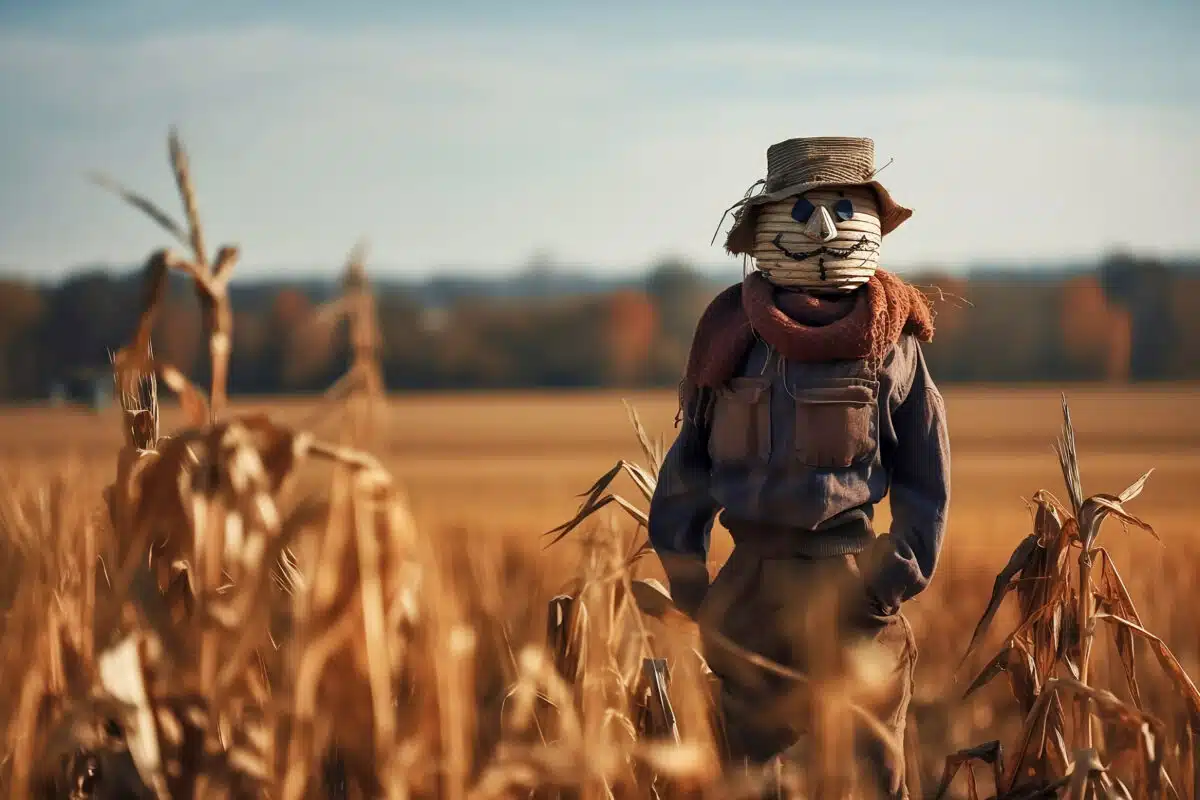
From “The Scarecrow, A Tale” by Richard Llwyd
Kind Heaven bade Hope, with features fair,
Dispel the thoughts that nurse despair,
To hint, that though immers’d in grief,
Unlook’d – for means, may bring relief;
To tell us, though in sight of ruin,
A thousand blessings may be brewing;
That though to -day may set in sorrow,
The sun of Joy may rise to-morrow.
A farmer, than his neighbours, wiser,
( By thoughtless spend -thrifts, called a miser)
A field , with such abundance stor’d,
That all the birds came there to board;
Where’er they fled , the beaky sinners,
Came there to eat their daily dinners;
At length to check the daring crew,
He fix’d a Scarecrow full in view;
The birds, who now, their feasting miss’d,
Collected, chatter’d, peck’d, and hiss’d,
And fearing, that some plot was hatching,
Suppos’d the farmer daily watching;
By caution led , they ey’d him round,
And each some striking feature found;
So ready is Imagination,
To furnish traits of self-creation,
But whether it was so or not,
They call’d a meeting on the spot?
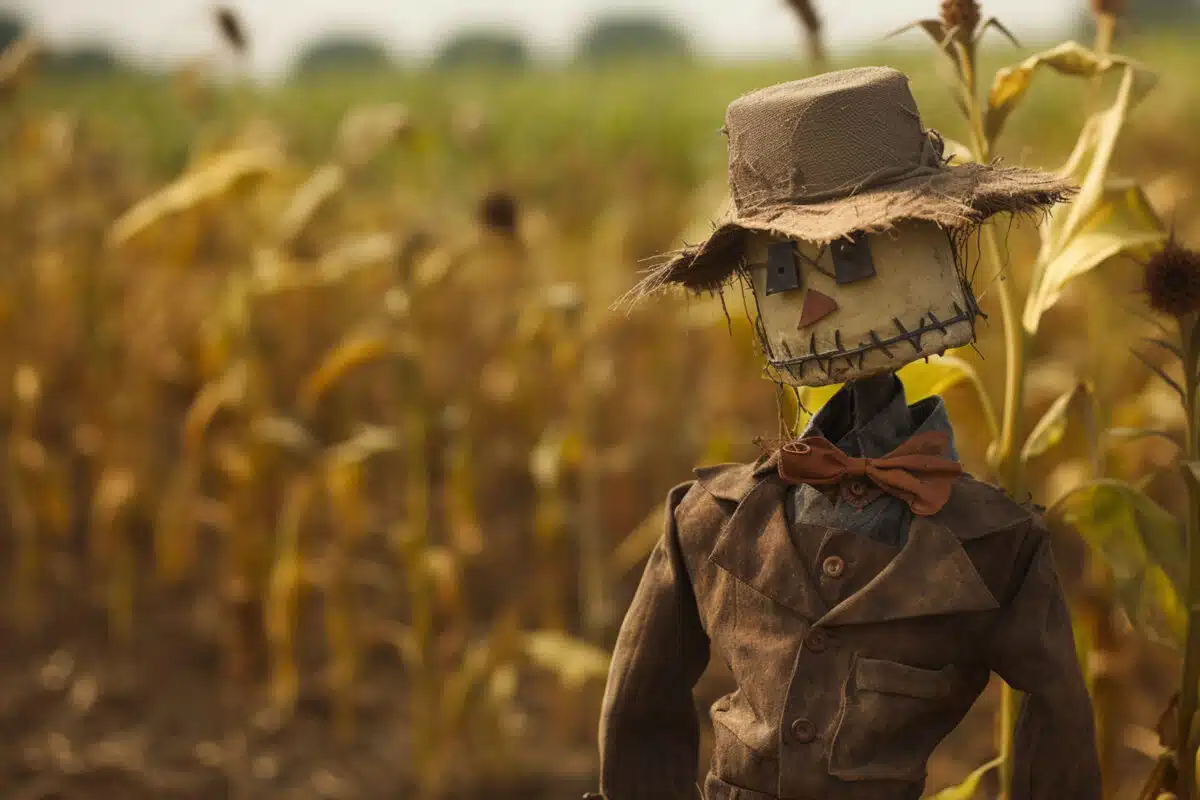
“The Scarecrow” by James Lyons
Oh here I stand the livelong day,
With fluttering rags and outstretched arms,
The feathered thieves to scare away
And save my master’s field from harms.
My head is empty, that I know,
Of rags and broomsticks am I made,
But still a servant true am I,
To keep my post am not afraid.
Though winds may blow, though rains may pour,
Though sunbeams warm around me play,
I keep my post and upright stand,
And do my best from day to day.
And though the people oft may laugh,
And think what little good am I;
It may be, that more so than they,
To do my best I always try.
So take a lesson true from this,
Although you feel of little good,
Remember there is work to do
For ragged coat and stick of wood.
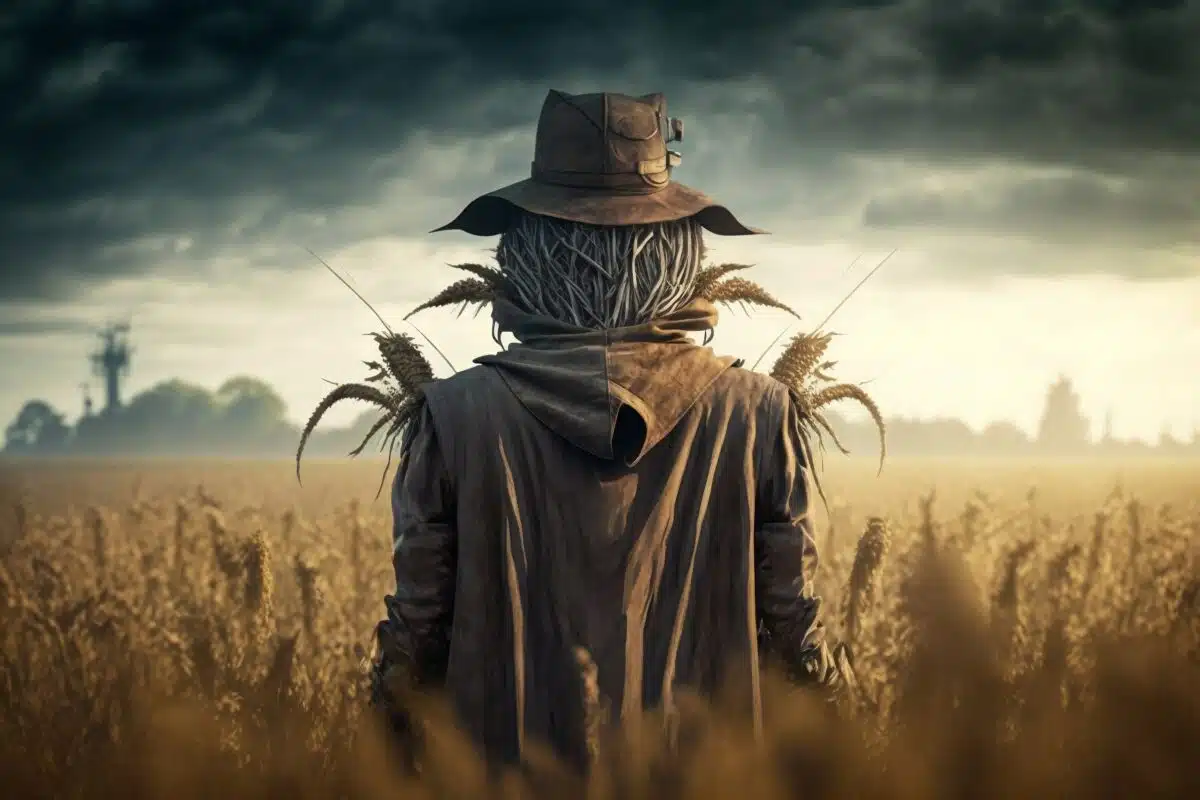
“The Scarecrow (2)” by Madison Julius Cawein
More than cakes or anything
I like tales of shivering.
Once a scarecrow on a hill
Tossed his ragged arms at me
That was when I went to see
Folks that live at Fisherville.
And my father said, ‘You know,
When it’s dark that old scarecrow
Gets down, rags and sticks and all,
And, like some old tramp, he goes,
Straw-wisps sticking from his toes,
Down the road, right past this wall.
‘Wobble-legged and loose of arm,
Slow he shambles by the farm:
And if children are not good,
Snug in bed at eight o’clock,
On the window he will knock
With long knuckled hands of wood.
‘Then his empty face pressed flat
To the pane, his tattered hat
Flopping in the wind, he’ll shake
His gaunt finger at them; and
Threaten them with head and hand,
And with teeth, too, like a rake.
‘Then into the night he’ll pack,
There to meet with bogie Jack,
Jack-o’-Lantern; and the two,
Arm in arm, will wander on,
Scaring folks until it’s dawn,
As all goblin people do.
‘You may see them through the pane
Passing in the night and rain:
When you hear the watch-dogs bark.
Then along the weedy side
Of some garden dim they glide,
Where they grab you in the dark.’
Sometime, when I can, for fun
I am going to take my gun;
Creep up on that hill and blow
That old scarecrow into bits
Then he can’t scare into fits
Any children more, I know.
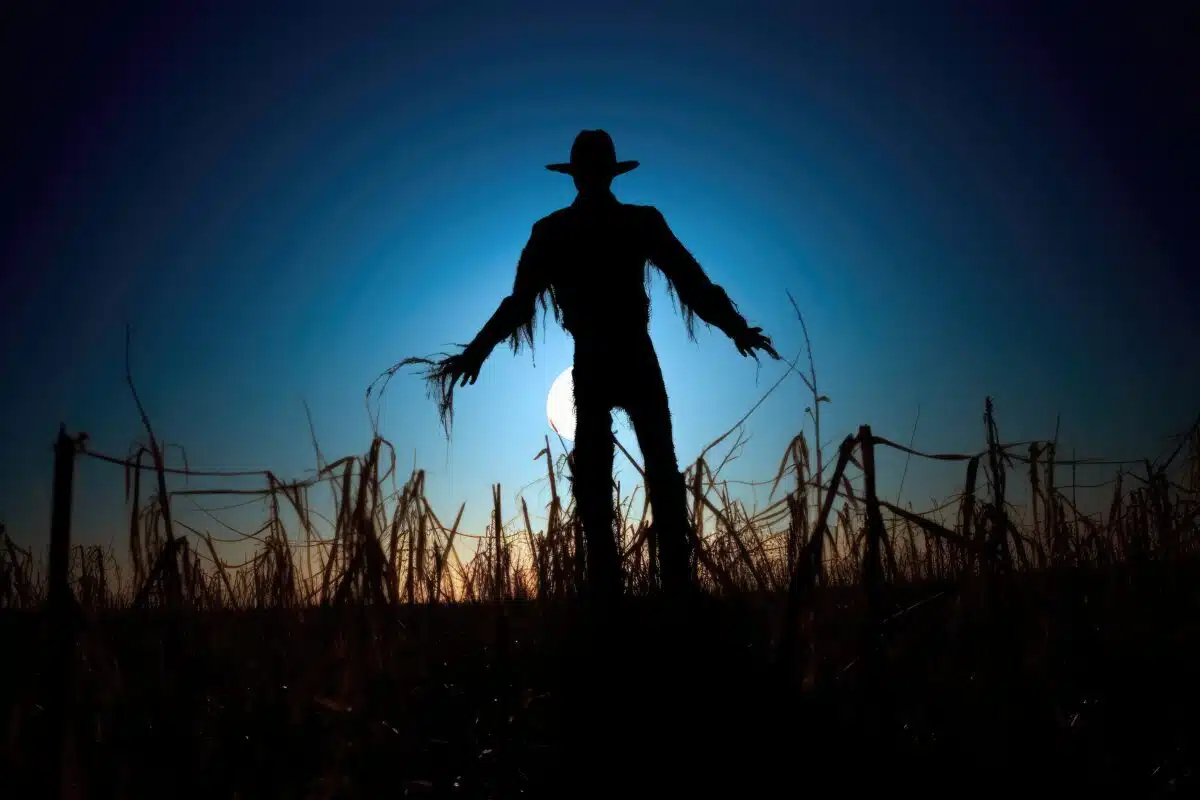
From “The Ballad of the White Horse” by G. K. Chesterton
Not less barbarian laughter
Choked Harold like a flood,
“And shall I fight with scarecrows
That am of Guthrum’s blood?
“Meeting may be of war-men,
Where the best war-man wins;
But all this carrion a man shoots
Before the fight begins.”
And stopping in his onward strides,
He snatched a bow in scorn
From some mean slave, and bent it on
Colan, whose doom grew dark; and shone
Stars evil over Caerleon,
In the place where he was born.
